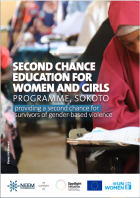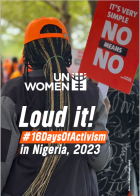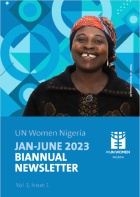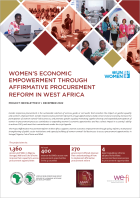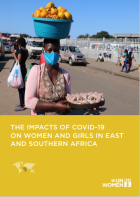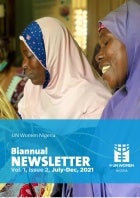1 - 20 of 48 Results
Pagination
Date:
The Burundi Country Gender Equality Profile (CGEP), 2023 edition scans the horizons and outlines the prospects for gender equality in Burundi with a view to creating an overview and establishing a baseline on the situation of Gender Equality in the country.
Date:
Under the Joint UN-EU Spotlight initiative, the Second Chance Education center for Women and Girls, Sokoto, was established to ensure GBV survivors in Sokoto get a second chance at economic empowerment and basic education. This document highlights some of the human impact stories made by the Joint UN-EU Spotlight initiative in Sokoto
Date:
This document gives an overview of the activities carried out during the 16 Days of activism 2023 Campaign in Nigeria.
Date:
The newsletter highlights efforts in Nigeria to promote gender equality and women's empowerment, emphasizing advocacy during the 2023 General Elections. It features initiatives such as assessing UN Women's Strategic Note, launching a strategic framework for development partners, and showcasing technological innovations by young Nigerians. Economic empowerment through affirmative procurement and human-interest stories are also included, as well as partners' contributions.
Date:
“HOW-TO-DO” TOOLKIT for the UNCT-SWAP Gender Equality SCORECARD - West and Central Africa region.
Date:
The Project Affirmative Procurement Reform in West Africa supports women economic empowerment through policy reforms, institutional strengthening of public sector institutions and capacity building of women-owned/-led businesses to access procurement opportunities in Senegal, Nigeria, Cote d’Ivoire and Mali.
This newsletter is distributed every six months, covering the journey of the project implementation across the most important events, outcomes, perspectives and other relevant information on gender responsive procurement.
Date:
This study builds on UN Women’s achievements and experience in supporting women and girls during the COVID pandemic within the East and Southern Africa Region and other parts of the world.
Date:
In 2021, despite the challenges and restrictions imposed by the COVID-19 pandemic, the UN Women Nigeria Country Office continued to implement programmatic, coordination and normative interventions as a contribution to efforts by the Government of Nigeria to close the gender inequality gap and advance the rights of women and girls.
Date:
This analytical study covered ten countries in the region and looked at issues of access to justice for women and girls in East and Southern Africa.
Date:
This report highlights UN Women Nigeria’s work for the year 2020. The report builds around the Nigeria Country Office programmatic areas of intervention and reflects the achievements attained in collaboration with various government and non-governmental partners who contributed to policy advocacy efforts, delivery of services, implementation, and funding of interventions aimed at promoting gender equality and women’s empowerment. The population at large (men, women, boys...
Date:
The UN Women WCARO annual report aims to share information about the regional office's activities on women empowerment and gender equality in 2020. The said year has been a particularly difficult year around the world with the COVID-19 pandemic. In West and Central Africa (WCA), women and girls were particularly vulnerable to the crisis. To counter these burdens and build medium and long- term recovery measures, the UN Women WCA Regional Office successfully provided multi-faceted assistance...
Date:
In Nigeria, women remain drastically underrepresented in peace processes. This is not entirely due to lack of capacity, but also due to lack of power and access as patriarchy plays a key role in excluding women from formal and informal peace processes. The report is a situational analysis of the participation of women as mediators in conflict resolution in Nigeria. It presents an in-depth understanding of the gaps and challenges of women mediators in the specific context of each of the six...
Date:
This brief presents emerging evidence on the role the private sector can play in promoting gender equality and women’s empowerment in Nigeria by highlighting the key measures companies can take to move beyond traditional corporate social responsibility to combine profits with gender progress. Realizing the growing need for gender equality is also germane to the survival and development of girls and the building of healthy communities, a healthy society, and a healthy nation. The economic...
Date:
Studies have been carried out to investigate the historical, security, political economy, environmental and humanitarian dimensions of the farmer–herder conflict, but very little attention has been paid to women’s participation in formal and informal mediation processes in the protracted conflict between farmers and herders. It is against this backdrop that this assessment seeks to fill this gap by providing on-the-ground evidence from Kaduna and Plateau States. Broadly speaking,...
Date:
This publication shows preliminary results and promising practices to support women’s economic empowerment and strengthen resilience in rural areas by promoting women’s access to land, finance, skills and technology for climate resilience and markets in West and Central Africa.
Date:
Women’s empowerment and gender equality represent long-standing global challenges on which significant progress has been made over the past few decades, albeit slowly and sporadically; however, this progress continues to be undermined by institutionalized unequal gender power relations based on social norms and practices. In the light of the current state of the world, where systemic oppression, ongoing conflicts, climate change, the COVID-19 pandemic and other epidemics...
Date:
This series, updated quarterly, illustrates the human impact of UN Women’s work across the world, highlighting the partnerships that make this work possible. These stories share how we and our many partners are striding forward to realize a better world for women and girls
Date:
This Guide is a useful document which provides direction to the Nigerian Legislature on their role in promoting the inclusion of women in decision-making, and in supporting the UNSCR 1325 agenda.
Date:
The ongoing crisis in Nigeria's North East region, compounded by the onset of the COVID-19 pandemic has left internally displaced persons even more vulnerable. 54% of the internal displaed population is female. The Rapid Gender Assessment undertaken by UN Women in collaboration with CARE International and Oxfam examines the gender-related impact of COVID-19 on women, men, girls and boys to inform the intervention response for the North-East.
Date:
The purpose of this note is to make proposals which constitute avenues for reflection which will allow the various actors to proactively adopt approaches sensitive to gender and conflict and making it possible to combine the fight against COVID-19 and the fight for peace.


